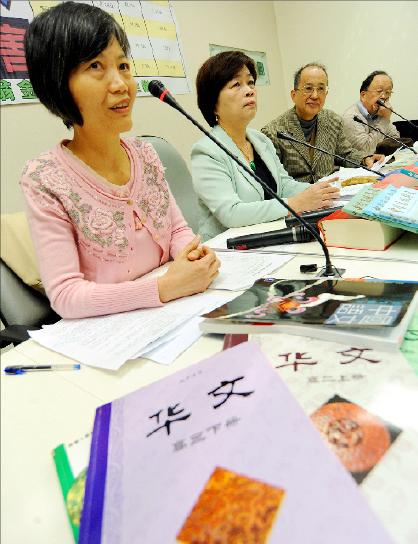A curriculum for high school students that has more emphasis on classical Chinese texts is not a good thing for either students or schools, Democratic Progressive Party Legislator Wong Chin-chu (翁金珠) said yesterday.
Wong, accompanied by Chang Jung Christian University’s Graduate Institute for Taiwan Studies visiting professor Chuang Wan-shou (莊萬壽), National Association of Parents’ Organizations chairman Hsieh Kuo-ching (謝國清) and Ministry of Education Curriculum Commission member Lin Lih-yun (林麗雲), criticized the education ministry’s recent decision to make the study of the Four Books — Great Learning (大學), Doctrine of the Mean (中庸), Analects of Confucius (論語) and Mencius (孟子), which are ancient Confucian classics written before 300BC — mandatory for high school students in an attempt to restore morality and prevent bullying.
Wong said that if the students spend so much time memorizing classical Chinese texts — which are written differently from the modern Chinese — they would not have time to study modern and world literature.

Photo: Lo Pei-der, Taipei Times
She went on to say that since President Ma Ying-jeou (馬英九) took office, classical Chinese texts have come to comprise 65 percent of the books read by high school students, compared with 45 percent before he was in office. Now that the government is further increasing the emphasis on Chinese classics by making the study of the Four Books mandatory, Wong said that it would be too much for students to handle.
Lin said the ministry increased the emphasis on Chinese classics in a curriculum submitted in September last year, after several members on the Curriculum Committee had been changed. However, the committee has now overruled the curriculum established in September and made the study of the Four Books mandatory.
“What is the basis for the change?” Lin asked.
Chuang said it doesn’t make sense to make the Four Books mandatory for high school students, considering that their study isn’t even mandatory for students at public universities.
He said that the Four Books were used as major textbooks in ancient times and contain no spirit of modernity. Therefore, he said it’s impossible to solve the problem of bullying at school by asking students to study the books.
Hsieh said that Taiwanese high school students attend school for 35 hours a week, which is much more than the 20 to 25 hour average for Western countries.
With such a harsh curriculum, Hsieh said, it would become difficult for each school to develop its own distinguishing feature.
In response, the ministry yesterday said it “humbly accepts all suggestions and criticisms and will forward the opinions to the Curriculum Committee for discussion.”

The Ministry of Education (MOE) is to launch a new program to encourage international students to stay in Taiwan and explore job opportunities here after graduation, Deputy Minister of Education Yeh Ping-cheng (葉丙成) said on Friday. The government would provide full scholarships for international students to further their studies for two years in Taiwan, so those who want to pursue a master’s degree can consider applying for the program, he said. The fields included are science, technology, engineering, mathematics, semiconductors and finance, Yeh added. The program, called “Intense 2+2,” would also assist international students who completed the two years of further studies in

Former president Tsai Ing-wen (蔡英文) departed for Europe on Friday night, with planned stops in Lithuania and Denmark. Tsai arrived at Taiwan Taoyuan International Airport on Friday night, but did not speak to reporters before departing. Tsai wrote on social media later that the purpose of the trip was to reaffirm the commitment of Taiwanese to working with democratic allies to promote regional security and stability, upholding freedom and democracy, and defending their homeland. She also expressed hope that through joint efforts, Taiwan and Europe would continue to be partners building up economic resilience on the global stage. The former president was to first

Taiwan will now have four additional national holidays after the Legislative Yuan passed an amendment today, which also made Labor Day a national holiday for all sectors. The Chinese Nationalist Party (KMT) and Taiwan People’s Party (TPP) used their majority in the Legislative Yuan to pass the amendment to the Act on Implementing Memorial Days and State Holidays (紀念日及節日實施辦法), which the parties jointly proposed, in its third and final reading today. The legislature passed the bill to amend the act, which is currently enforced administratively, raising it to the legal level. The new legislation recognizes Confucius’ birthday on Sept. 28, the

MORE NEEDED: Recall drives against legislators in Miaoli’s two districts and Hsinchu’s second district were still a few thousand signatures short of the second-stage threshold Campaigners aiming to recall Chinese Nationalist Party (KMT) legislators yesterday said they expect success in 30 out of 35 districts where drives have passed the second-stage threshold, which would mark a record number of recall votes held at once. Hsinchu County recall campaigners yesterday announced that they reached the second-stage threshold in the recall effort against Legislator Lin Szu-ming (林思銘). A total of 26,414 signatures have been gathered over the past two months, surpassing the 10 percent threshold of 23,287 in Hsinchu County’s second electoral district, chief campaigner Hsieh Ting-ting (謝婷婷) said. “Our target is to gather an additional 1,500 signatures to reach